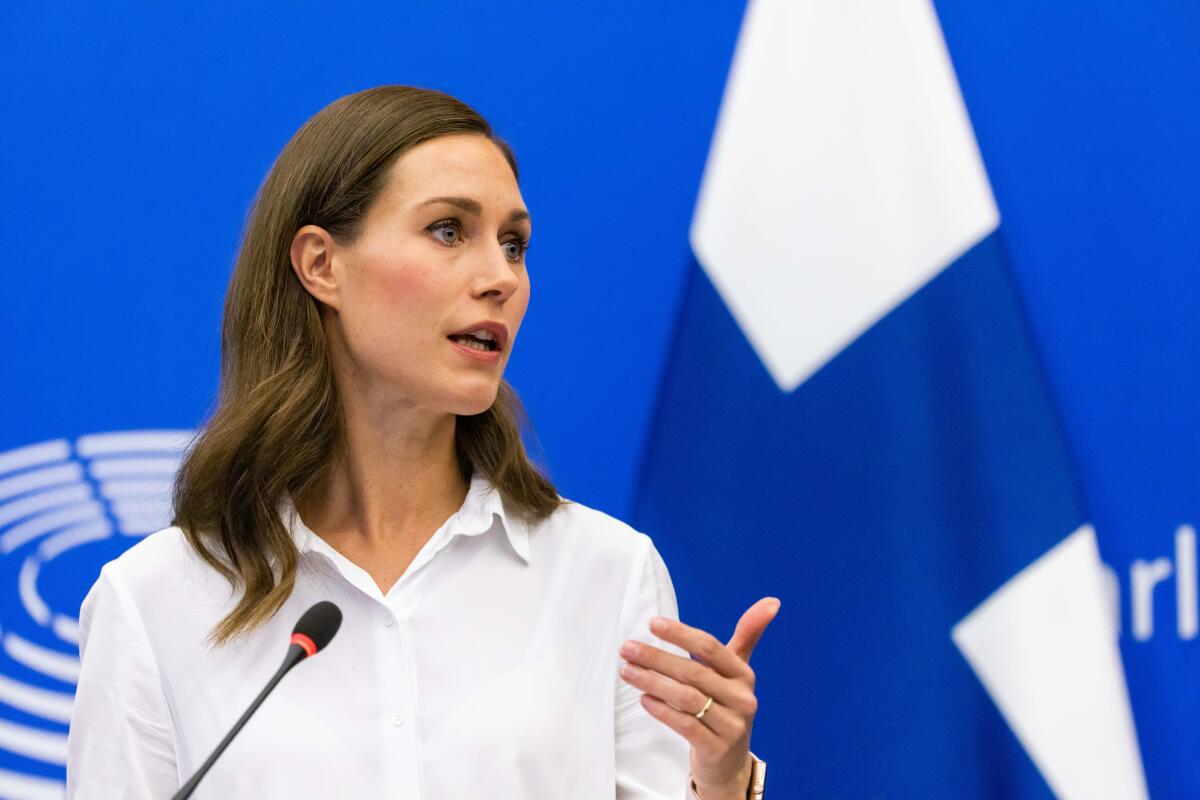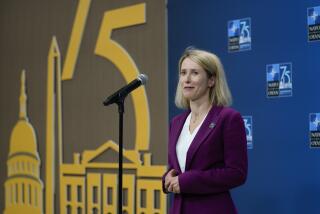Partying Finnish prime minister tests gender parity, decorum

- Share via
HELSINKI — The young Finnish prime minister drew a deep breath and looked directly into the cameras. She regretted, she said, that raucous images of late-night revelry with her friends had made their way into the public eye.
But she also made clear her belief that busting out dance-like-no-one’s-watching party moves did not interfere with her duties of state.
Finland is known worldwide as a gender-equality pioneer. But despite the country’s progressive traditions, many here believe 36-year-old Sanna Marin, in office just over two years, is being held to a harsher standard than a male leader would be in similar circumstances.

“When breaking glass ceilings, you will naturally get scratched,” said the country’s premier elder stateswoman, Tarja Halonen, 78, who was Finland’s first female president. “Women in general tend to be measured not by the substance of their politics, but by their looks, their clothes or their family status.”
To outsiders, the summer’s weeks-long contretemps over the prime minister’s after-hours activities might seem like a tempest in a Nordic teapot. But coming at a particularly grave moment in international affairs — most notably, the war in Ukraine — it has set off debate about what constitutes proper decorum.
“This is not about whether she can party or not,” Joona Räsänen, the leader of Marin’s party in the capital region, told the Helsingin Sanomat newspaper. “Everybody has a right to a private life, but don’t publicize it.”
Marin’s defenders argue that she has repeatedly demonstrated the seriousness of her commitment to the job, staking out thoughtfully reasoned positions on the COVID-19 pandemic and climate change, as well as charting a course toward membership in the North Atlantic Treaty Organization — a sharp break with the country’s longtime policy.
Despite those achievements, she is often dogged by emphasis on how she dresses and her demeanor. A write- up in Vogue magazine noted her accomplishments, but also dwelled on her fashion sense. In October 2020, when Marin had been in office only a few months, an outcry erupted over a cover photo of her in the Finnish women’s magazine Trendi, in which she wore a blazer with no shirt underneath.
“If you had to generalize it, it will be men saying it was wrong, and women saying it was fabulous,” a magazine spokeswoman, Mari Paalosalo-Jussinmäki, told CNN at the time. Marin said a stylist had made the wardrobe call.
On the feminist front, Finland has long outpaced the rest of the world. What was then the Grand Duchy of Finland gave women the right to vote in 1906, 14 years before women’s suffrage in the United States. Only Iceland outranks Finland’s gender-equality scores, according to the World Economic Forum’s 2022 ranking of 146 countries.
Although there is an earnings lag — Finnish women make about 85 cents on the euro, compared to men — women hold 91 of 200 parliamentary seats, and hold nearly 60% of the advanced degrees awarded in the country.
Halonen, who was elected president in 2000 and served two six-year terms, was a prime example of Finland’s female-friendly political environment. She held major ministerial portfolios assuming the presidency. Forbes magazine ranked her among the most powerful 100 women in the world — a distinction it later bestowed on Marin — and her approval ratings peaked at an enviable 88%.
Yet even she saw herself as held to “higher standards, definitely different standards” during her public tenure. “Many issues that were normal for male presidents had to be considered if they were also fitting for a female president,” she said in an interview with the Los Angeles Times.
Marin, too, was a trailblazer, becoming the world’s youngest prime minister when she took office at 34. Raised by lesbian parents in the traditionally working-class inland city of Tampere, she was the first person in her family to attend university. She had a child in 2018 with her longtime partner, Markus Räikkönen, and the couple married in 2020.
Marin’s clubbing habits ran afoul of critics back in December 2021, when she went out on the town with friends during Finland’s Independence Day holiday weekend without her official phone. Government officials who discovered the prime minister had been exposed to COVID-19 could not reach her until the following day. (She did not contract the disease.)
In August of this year, leaked video of the prime minister’s uninhibited dancing at a private Helsinki apartment party went viral, with critics pointing out that the early-morning episode came shortly before the start of a workday. Marin voluntarily took and passed a drug test, although she said she considered it unjust that the onus was on her to provide proof that she was not using any illegal substance.
But her woes weren’t over. A few days later, a TikTok image emerged of two topless women kissing at the prime minister’s state-owned official residence, partly obscured by a country-identifying sign the prime minister usually uses during international virtual events. Marin said the picture was inappropriate and apologized, but added that “otherwise, nothing extraordinary happened at the get-together.”
By then, the party narrative had captured world attention. “Keep dancing,” Hillary Clinton tweeted at the prime minister, who responded with a heart emoji. Women across the globe posted carefree dance clips of themselves. Late-night comics had a field day, with Trevor Noah joking that Marin got caught on video having exuberant fun because she actually had “friends young enough to know how to use a phone.”
Finns, though, found it all far less funny. A poll conducted by Helsingin Sanomat indicated that 42% of those surveyed believed Marin’s image had been hurt by the partying flap. Heading into 2023 spring elections, Marin’s Social Democratic Party holds a slight majority, but the party’s demographic skews older and working class, setting up a potential slide in support.
“The world sees the Finnish prime minister enjoying life, but people see it here as clubbing on the public dime,” said communications consultant Harri Saukkomaa.
Although Marin expressed dismay about the leaking images she considered private, she has a powerful social-media presence, with half a million Twitter followers and 1 million on Instagram. That allows her to tailor her own messaging, bypassing traditional media outlets, but with the dual-edge effect of bringing her non-official life into the open.
Halonen, the former president, said the rise of social media made it harder for political figures, both male and female, to protect their private lives. As to whether Marin’s troubles had dented Finland’s leading-edge reputation on gender equality, she said she hoped not.
“Finland is a good place for gender equality, but of course we are not perfect,” she said. “We also have to remember that leadership is not just a battle between genders. It is about equal possibilities for every human being.”
Hunt is a special correspondent.
More to Read
Sign up for Essential California
The most important California stories and recommendations in your inbox every morning.
You may occasionally receive promotional content from the Los Angeles Times.










